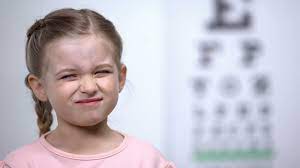If you have a nearsighted child, you know how difficult myopia (nearsightedness) can sometimes be. Unfortunately, many parents are unaware that rapidly progressing myopia is more than just a nuisance; it can endanger your child’s eye health. Children with rapidly progressing myopia are far more likely to develop potentially sight-threatening eye diseases later in life, such as glaucoma, cataracts, and macular degeneration.
What Causes Worsening Myopia?
Myopia development is heavily influenced by genetics. For example, a child with two nearsighted parents is more likely to be myopic than a child with only one myopic parent or no myopic parents at all.
Nobody knows why childhood myopia develops, but spending most of the day indoors and focusing on nearby objects such as screens and books may be risk factors. However, more research is needed to determine whether the fact that children are spending less time looking at distant objects, such as a moving baseball or a basketball net, is contributing to the global increase in myopia cases.
How Can I Keep Myopia from Worsening?
Increasing your child’s outdoor playtime in the sun is one of the best pieces of advice for parents of nearsighted children. In research studies, children who spent a significant amount of time in the sun had a slower progression of myopia than children who did not.
The World Health Organization recommends that children under the age of five spend no more than one hour per day in front of a screen and that infants under the age of one have no screen time at all. The Children’s Eye Foundation recommends daily outdoor play and no screen time for children under the age of two. They also suggest that children aged 2 to 5 spend no more than 1-2 hours per day, with frequent breaks.
What Can a Myopia Management Eye Doctor Do for You?
Eye doctors who treat myopia do more than just prescribe corrective lenses. Although there is no cure for myopia, there are methods for controlling its progression.
Among the current treatments are:
- Eye drops containing atropine
- Orthokeratology (abbreviated “ortho-k”) contact lenses that are gas permeable
- Contact lenses/multifocal glasses
The doctor will determine the best treatment plan for your child’s eye health and lifestyle after performing a thorough eye exam. Myopic children should have annual eye exams to monitor any changes in vision. It’s important to note that not all optometrists manage myopia.


